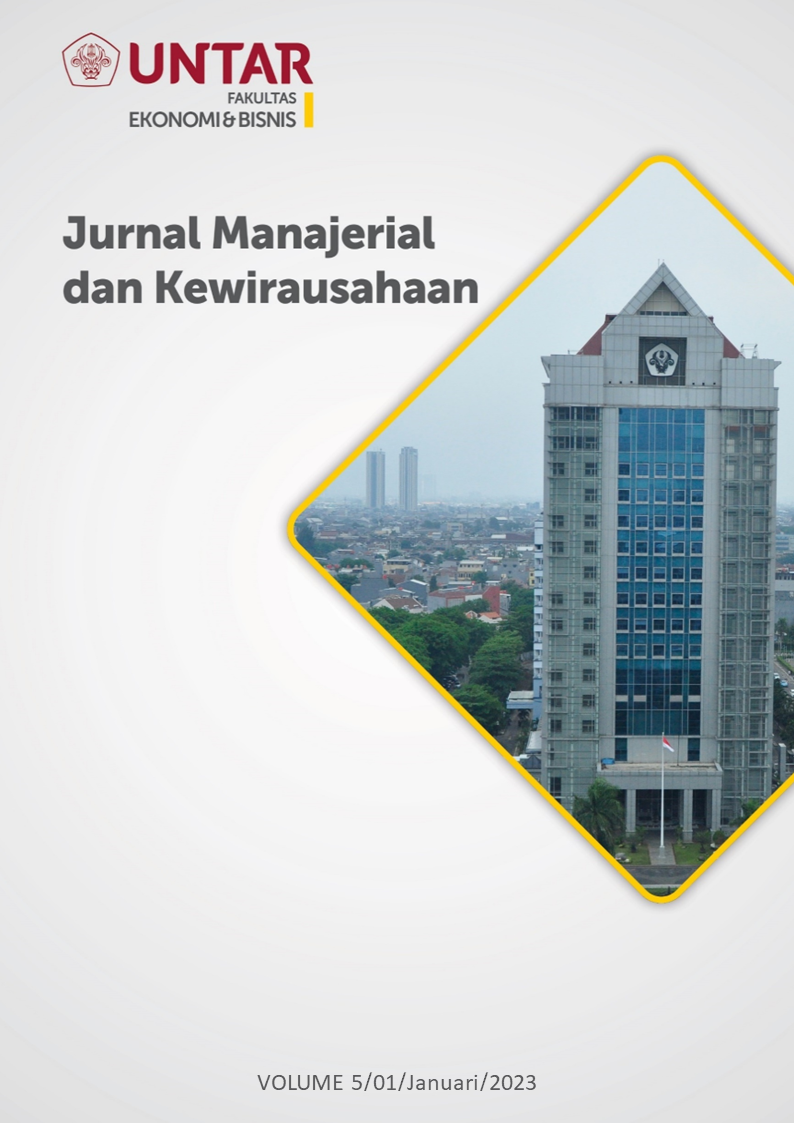Pengaruh Faktor Keluarga, Ciri Kepribadian, dan Efikasi Diri terhadap Intensi Berwirausaha Mahasiswa/i Perguruan Tinggi Swasta DKI Jakarta
Main Article Content
Abstract
Tujuan dari penelitian ini adalah untuk menguji apakah terdapat pengaruh dari Faktor Keluarga, Ciri Kepribadian, dan Efikasi Diri terhadap intensi berwirausaha mahasiswa/i perguruan tinggi swasta Di DKI Jakarta. Teknik pengambilan sampel yang digunakan dalam penelitian ini adalah non-probability sampling dengan teknik purposive sampling karena dalam pengambilan sampel ini terbatas pada jenis orang tertentu yang dapat memberikan informasi yang diinginkan. Data pada penelitian ini diperoleh dari penyebaran kuesioner dalam bentuk Google form yang disebarkan pada mahasiswa/i perguruan tinggi swasta di DKI Jakarta. Alat analisis data yang digunakan adalah Smart-PLS. Hasil dari penelitian ini adalah 1) Faktor keluarga tidak memiliki pengaruh terhadap intensi berwirausaha, 2) Ciri kepribadian ekstroversi memiliki pengaruh terhadap intensi berwirausaha, 3) Ciri kepribadian ramah tidak memiliki pengaruh terhadap intensi berwirausaha, 4) Ciri kepribadian ketelitian memiliki pengaruh terhadap intensi berwirausaha, 5) Ciri kepribadian terbuka pada pengalaman memiliki pengaruh terhadap intensi berwirausaha, 6) Ciri kepribadian neurotisisme tidak memiliki pengaruh terhadap intensi berwirausaha 7) Efikasi diri tidak memiliki pengaruh terhadap intensi berwirausaha. Hasil penelitian ini bertujuan untuk mengetahui pengaruh faktor keluarga, ciri kepribadian dan efikasi diri terhadap intensi berwirausaha seseorang.
The purpose of this study was to examine whether there is an influence of family factors, personality traits, and self-efficacy on entrepreneurial intentions of private university students in DKI Jakarta. The sampling technique used in this research is non-probability sampling with purposive sampling technique because this sampling is limited to certain types of people who can provide the desired information. The data in this study were obtained from distributing questionnaires in the form of Google Forms which were distributed to students of private universities in DKI Jakarta. The data analysis tool used is Smart-PLS. The results of this study are 1) Family factors have no influence on entrepreneurial intentions, 2) Extroversion personality traits have an influence on entrepreneurial intentions, 3) Agreeableness personality traits have no influence on entrepreneurial intentions, 4) Conscientiousness personality traits have an influence on entrepreneurial intentions, 5) Open to experience personality traits have an influence on entrepreneurial intentions, 6) Neuroticism personality traits have no influence on entrepreneurial intentions 7) Self-efficacy has no influence on entrepreneurial intentions. The results of this study aim to determine the effect of family factors, personality traits and self-efficacy on one's entrepreneurial intentions.
Article Details
Section

This work is licensed under a Creative Commons Attribution-NonCommercial-ShareAlike 4.0 International License.
This work is licensed under a Jurnal Muara Ilmu Ekonomi dan Bisnis Creative Commons Attribution-ShareAlike 4.0 International License.,/p>
References
Antoncic, B., Bratkovic Kregar, T., Singh, G., & Denoble, A. F. (2015). The Big Five Personality-Entrepreneurship Relationship: Evidence from Slovenia. Journal of Small Business Management, 53(3), 819–841. https://doi.org/10.1111/jsbm.12089
Aparicio, S., Urbano, D., & Audretsch, D. (2016). Institutional factors, opportunity entrepreneurship and economic growth: Panel data evidence. Technological Forecasting and Social Change, 102, 45–61. https://doi.org/10.1016/j.techfore.2015.04.006
Aritonang, Lerbin R. (1998). Riset Pemasaran Teori & Praktik, Jakarta: Tarumanagara University Publishing Unit.
Barrick, M. R., Mount, M. K., & Judge, T. A. (2001). Personality and Performance at the Beginning of the New Millennium: What Do We Know and Where Do We Go Next? International Journal of Selection and Assessment, 9(1–2), 9–30. https://doi.org/10.1111/1468-2389.00160
Boyd, N. G., & Vozikis, G. S. (1994). The Influence of Self-Efficacy on the Development of Entrepreneurial Intentions and Actions. Entrepreneurship Theory and Practice, 18(4), 63–77. https://doi.org/10.1177/104225879401800404
Carr, J. C., & Sequeira, J. M. (2007). Prior family business exposure as intergenerational influence and entrepreneurial intent: A Theory of Planned Behavior approach. Journal of Business Research, 60(10), 1090–1098. https://doi.org/10.1016/j.jbusres.2006.12.016
Chandler, G. N., & Hanks, S. H. (1994). Founder Competence, the Environment, and Venture Performance. Entrepreneurship Theory and Practice, 18(3), 77–89. https://doi.org/10.1177/104225879401800306
Ciavarella, M. A., Buchholtz, A. K., Riordan, C. M., Gatewood, R. D., & Stokes, G. S. (2004). The Big Five and venture survival: Is there a linkage? Journal of Business Venturing, 19(4), 465–483. https://doi.org/10.1016/j.jbusvent.2003.03.001
Costa, P. T. (1992). Four ways five factors are not basic. Personality and Individual Differences, 13(6), 667–673. https://doi.org/10.1016/0191-8869(92)90237-J
Farrukh, M., Khan, A. A., Shahid Khan, M., Ravan Ramzani, S., & Soladoye, B. S. A. (2017). Entrepreneurial intentions: the role of family factors, personality traits and self-efficacy. World Journal of Entrepreneurship, Management and Sustainable Development, 13(4), 303–317. https://doi.org/10.1108/wjemsd-03-2017-0018
Goldberg, L.R., John, O.P., Kaiser, H., Lanning, K. and Peabody, D. (1990), “An alternative ‘description of personality’: the big-five factor”, Structure, Vol. 59 No. 6, pp. 1216-1229
Hussain, A., & Norashidah, D. (2015). Impact of Entrepreneurial Education on Entrepreneurial Intentions of Pakistani Students. Journal of Entrepreneurship and Business Innovation, 2(1), 43. https://doi.org/10.5296/jebi.v2i1.7534
Karabulut, A. T. (2016). Personality Traits on Entrepreneurial Intention. Procedia - Social and Behavioral Sciences, 229, 12–21. https://doi.org/10.1016/j.sbspro.2016.07.109
Kolvereid, L. (1996). Prediction of Employment Status Choice Intentions. Entrepreneurship Theory and Practice, 21(1), 47–58. https://doi.org/10.1177/104225879602100104
McCrae, R. R., & Costa, P. T. (1987). Validation of the Five-Factor Model of Personality Across Instruments and Observers. Journal of Personality and Social Psychology, 52(1), 81–90. https://doi.org/10.1037/0022-3514.52.1.81
McElwee, G., & Al-Riyami, R. (2003). Women entrepreneurs in Oman: Some barriers to success. Career Development International, 8(7), 339–346. https://doi.org/10.1108/13620430310505296
McClelland, D.C. (1961), The Achievement Society, Von Nostrand, Princenton, NJ.
Peterman, N. E., & Kennedy, J. (2003). Peterman2003. Entrepreneurship Theory and Practice, 129–144.
Raja, U., Johns, G., & Ntalianis, F. (2004). The Impact of Personality on Psychological Contracts. Academy of Management Journal, 47(3), 350–367. https://doi.org/10.5465/20159586
Slamet, F., Tunjungsari, H. K., Ie, M. (2018). Dasar-dasar kewirausahaan: Teori dan praktik. (3rd ed.). Jakarta: Indeks.
Sekaran, U. & Bougie, R. (2014). International Standard Classification of Occupations (ISCO). Encyclopedia of Quality of Life and Well-Being Research, 3336–3336. https://doi.org/10.1007/978-94-007-0753-5_102084
Singh, G. & DeNoble, A. (2003), “Views on self-employment and personality: an exploratory study”, Journal of Developmental Entrepreneurship, Vol. 8 No. 3, pp. 265-281.
Zhao, H., Seibert, S. E., & Lumpkin, G. T. (2010). The relationship of personality to entrepreneurial intentions and performance: A meta-analytic review. Journal of Management, 36(2), 381–404. https://doi.org/10.1177/0149206309335187

